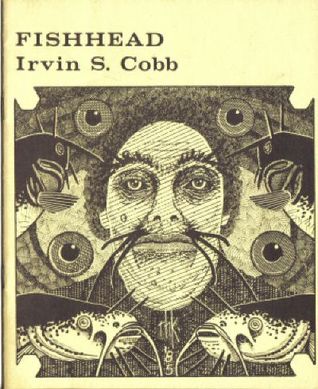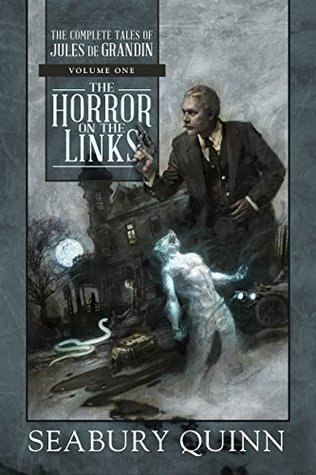
Pulp Gem




 The Abominations of Yondo by Clark Ashton Smith
The Abominations of Yondo by Clark Ashton Smith
So I’ve got the itch to go diving through some old pulp fiction magazines once again and I thought rather than write up a review of it and post it somewhere with the off chance that someone who reads the same obscure things goes looking for someone else who has read it, it would start a group to talk about the story.
I’ll be posting the first story at the beginning of next month, so stay tuned. But it will be in the public domain on the Pulp Magazine Archive, so anyone with an internet connection will have free access to it.
This will be my first Goodreads group, and so I don’t know how much traction I’m going to get, but I figure what the hell. So if you are interested in talking about a fun, quick, and probably over the top little read, this is going to be the group for you!
Here is the link to the group: https://www.goodreads.com/group/show/1099571-classic-pulp-review
It’s an open group, so feel free to join now, even if you plan on participating later. All are welcome!


 Fishhead by Irvin S. Cobb
Fishhead by Irvin S. Cobb
My rating: 5 of 5 stars
What blew me away about this story, and other stories by Cobb is his ability to paint an amazing picture of an exotic landscape. If you spend just a moment and read the first couple of paragraphs of this story you will understand how powerful his words are, and how immersive such writing can be.
This particular story I think serves better as an interesting piece in the greater cannon of material revolving around fish people that can be found in weird fiction and supernatural pulps, than perhaps a stand alone story.
Nevertheless I think because it is so short and it contains such masterful description and relatable situations I would recommend it to almost anyone interested in speculative fiction. You will fly through this story in one sitting and be glad that you did.

 The Horror on the Links by Seabury Quinn
The Horror on the Links by Seabury Quinn
My rating: 5 of 5 stars
I don’t know what it is about Jules de Grandin stories that I like so much. They are not usually all that inventive, edgy, or linguistically impactful. The characters don’t really develop in any meaningful ways, and the plots usually are pretty formulaic. But with all that said these stories are so endearing and fun to read.
It’s kind of like eating icing, supernaturally laced early 20th-century icing. You don’t want to make a whole meal out of it, but rather indulge in it every now and again between other pieces of fiction. Like a long-running TV series, you’ll come to enjoy the familiar set of characters and their quirks, and begin to look out for the nuances in their personalities and relish the predicaments they find themselves in each episode.
Like a B-movie mashup of Hercule Poirot and Sherlock Holmes, these stories are great fun. I would recommend them to anyone who is looking for a great introduction to classic Weird Tales magazine material, or anyone who enjoys splashing around in the shallow waters of occult investigation stories.

You probably have heard of the movie The Neverending Story, but if you are like me not so much about the book. So in the interests of self-discovery, and for the love of a good book I’ve decided to make something special of my reading of Michael Ende’s Neverending Story. Specifically looking at the symbolism in the book, discussing what resonates with me and what I think makes this piece so powerful.
![]()
[T]he story begins with a simple scene of Bastion coming to Coreander’s book store. We learn that Bastion is a picked-on kid, that I picture to be about in middle school age, and that really doesn’t have a whole lot going for him. He doesn’t do well in school, he doesn’t go in for sports, and he feels pretty bad about himself. So as far as the story goes you really couldn’t have asked for a better protagonist if you want the nature of the tale to be about self-discovery.
Coreander’s book store seems like the kind of place that I would really like. Quiet, seemingly off of the beaten path, and full of esoteric materials. Carl Coreander comes off as a gruff, unsympathetic grownup who doesn’t have much of a care for kids, even one so pathetic as Bastion. I did wonder at this point how Carl came into possession of the book, or if its origin is ever explained in the text. It changing hands to Bastion is momentous, but what of Coreander, what did the book represent to him?
The hook, of course, is the acquisition of the Neverending Storybook by Bastion. He is seemingly preternaturally drawn to it, and can’t help himself but steal it once Carl’s back is turned. This being drawn to and stealing of the book feels a bit forced, less guided and more manhandled by the will of the author. But I guess in a book where you have fate playing such a big role, you can get away with a bit of a kick in the pants to get the ball rolling.
The symbolism that really comes through for me in this little preamble is the book itself. Clearly representing the want for escape by our protagonist, and the gateway into the unknown.
Bastion doesn’t know where to go and ends up hidden away in his school’s attic, where he makes himself comfortable and begins reading the story.